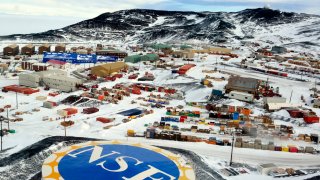
From Sunday, workers at the main United States base in Antarctica will no longer be able to walk into a bar and order a beer, after the federal agency that oversees the research program decided to stop serving alcohol.
McMurdo Station will not be going entirely dry, the National Science Foundation confirmed. Researchers and support staff will still be able to buy a weekly ration of alcohol from the station store. But the policy shift could prove significant because the bars have been central to social life in the isolated environment.
The changes come as concerns grow that sexual misconduct has been allowed to flourish at McMurdo. An investigation by The Associated Press last month uncovered a pattern of women who said their claims of harassment or assault were minimized by their employers, often leading to them or others being put in further danger.
In some of the cases outlined by the AP, alcohol played a role. But the NSF told the AP the changes involving alcohol were related to morale and welfare at the base, and were not aimed at preventing sexual harassment or assault.
Get Philly local news, weather forecasts, sports and entertainment stories to your inbox. Sign up for NBC Philadelphia newsletters.
Under the new rules taking effect Sunday, workers will be able to order only alcohol-free drinks at McMurdo's two main bars, Southern Exposure and Gallagher’s. They will still be able to bring their own alcohol to drink at the bars. A third venue which also served alcohol, the Coffee House, will become entirely alcohol-free but will now stay open for workers to visit any time of the day or night.
The current alcohol ration allows Antarctic workers to buy up to the equivalent of 18 beers each week, or three bottles of wine, or a 750 milliliter (25 ounce) bottle of spirits.
The NSF said it's also instituting several new measures during the current southern hemisphere spring and upcoming summer that are aimed at preventing sexual harassment and assault at the base, where typically around 70% of workers are men. These include enhanced training, a new survey to collect data and monitor trends, and visits to the ice from experts.
U.S. & World
Stories that affect your life across the U.S. and around the world.
Karen Marrongelle, the NSF's chief operating officer, said it was committed to ensuring a safe environment wherever science or education was conducted.
“We will not rest until we are confident that every member of the Antarctic community feels safe and supported,” she said in a statement.
The NSF published a report in 2022 in which 59% of women said they’d experienced harassment or assault while on the ice, and 72% of women said such behavior was a problem in Antarctica. Last year, the NSF created an office to deal with such complaints, provided a confidential victim’s advocate, and established a 24-hour helpline.
The AP investigation found a pattern of problems at McMurdo. One woman who reported a colleague had groped her was made to work alongside him again. Another woman who told her employer she was sexually assaulted was fired two months later. Another woman said bosses at the base downgraded her allegations from rape to harassment.
After the AP published its investigation, the NSF sent a message to U.S. Antarctic Program workers.
“We know that it can be difficult to hear these accounts. It is for us,” the NSF wrote in the email, which was obtained by the AP. “These are not experiences we want anyone to have within the USAP (or anywhere else in the world).”
The email outlined the new anti-harassment measures the NSF planned to implement and offered resources for support.
Jennifer Sorensen, who told the AP she was raped at McMurdo in 2015, said the NSF had tried unsuccessfully before to blame alcohol for the high rates of sexual misconduct at the base.
“They know full well that all the rationing or denial of alcohol sales being forced on us isn't going to do a damn thing,” she said.
If the NSF and lead contractor Leidos were serious about stopping sexual misconduct, they should start believing survivors and ensure they aren't retaliated against, she said. They should also stop rehiring perpetrators, she added.
“Alcohol can obviously blur the lines of consent, there's that issue at play, but overwhelmingly, sexual assault has occurred even when neither party has been consuming alcohol, as was the case with me,” Sorensen said. “So it's definitely not going to eliminate the problem."
Sorensen said that if the NSF wants to reduce drinking, it should provide alternative diversions, such as the bowling alley, ceramic studio and greenhouse which used to be features at McMurdo but have disappeared due to budget cutbacks.
Britt Barquist, who said she was groped at McMurdo in 2017, said in an email it was positive that the NSF was making an effort to improve the culture at the base. But she remained concerned that incidents were still being swept under the rug when it put a contracting company's primary objectives at risk.
“For example, my incident took place during work hours, at a job site, no alcohol involved, and was corroborated and reported through official channels,” Barquist wrote. “I was later told by my company’s HR that I would have to work with the perpetrator again because his job was mission-critical and there was no one else to fill his role. None of these new policies implemented by the NSF would prevent that from happening again.”
The NSF and Leidos have declined to answer questions about Barquist's case, or others highlighted in the AP's report.
Under another new initiative to improve morale, the NSF said it will be expanding internet access through the satellite network Starlink, allowing workers to stay better connected to people back home. Starlink is run by SpaceX, the company founded by Elon Musk.
The NSF first foreshadowed impending changes to its alcohol policies in a blog post early last month, and said it first told workers about the new anti-harassment measures in mid-August.
The AP sent the NSF a detailed list of questions about its investigation in early June and has continued to correspond since, including asking for any planned changes to address sexual harassment and assault. The NSF never listed any planned changes to alcohol policies.
“Because these changes are related to morale and welfare and not sexual assault/harassment prevention, we did not mention this program initiative in our previous response,” the NSF said in a statement.



